Gregory Larson
Abner Haynes, Sr.
Bruce McMillan
A Talented Athlete Since Birth
Bruce McMillan was born on June 26, 1950, in Northern Ontario, where hockey was a way of life. He started playing the sport at an early age on outdoor rinks, and his athleticism was apparent even during youth. Bruce played Junior A hockey with the Soo Greyhounds, then picked up football in junior high school. After playing both sports at Mount Allison University, he was the first draft pick for the CFL’s Ottawa Roughriders in 1973.
Once Bruce’s playing days were over, he worked various jobs including high school teacher and principal, appraiser, real estate agent, and ice rink manager. In his free time, Bruce was an avid tennis player and fisherman. But his most important role was that of a husband and father to four wonderful children. The love he showed to his family had no boundaries. He was blindly loyal, fiercely intense, and exceptionally hard working with a high EQ.
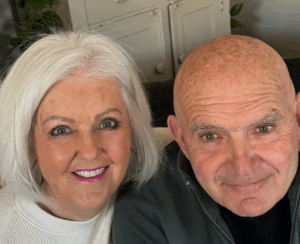
Bruce’s competitive spirit was matched only by his commitment to our local community. He continued to stay involved in sports by coaching numerous teams in hockey, football, and basketball, sharing his knowledge with countless young athletes. Bruce’s dedication to mentorship throughout his life made a lasting impact on all the youth he worked with, instilling them with confidence, resilience, and purpose.
The Effect of Brain Injuries
Bruce had a number of concussions before the age of 18; our family and friends have counted at least 11. That number grew as he continued to play contact sports in university and professionally. He experienced headaches, but never migraines. Throughout his life, Bruce also suffered from bleeding ulcers; a result, perhaps, of trauma from his childhood.
We really noticed Bruce starting to act impulsively in his late 40s. By the time he turned 60, his loss of memory was evident, and his mood and behavior changed drastically. He became aggressive, totally egocentric, and was easily angered. During our daily five mile walks, Bruce would get in the faces of strangers and frightened a number of people. His driving was erratic and he became involved in a fender bender, forcing us to take his license away.
Bruce had trouble staying still and would wander around, always trying to escape from our home. We had to keep a GPS device on Bruce at all times, and eventually even put locks inside our doors, requiring codes to leave.
Bruce’s decline affected our family greatly. His grandchildren were nervous to be around him, even fearing him at times. Some days he would be the fun Papa, but mostly he would have absolutely no patience with them. It was heartbreaking to watch.
For 13 years, I tried my absolute hardest to keep Bruce safe at home, until he was hospitalized for the last three weeks of his life. He became out of control and needed more help than I was able to provide. He had to be restrained in a bed to keep from escaping and potentially injuring one of the medical staff.
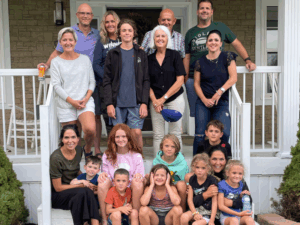
A Continuing Legacy
We found out about the Concussion Legacy Foundation a few years ago while trying to find help online. I signed up for their emails and went through all their resources, becoming convinced Bruce was suffering from suspected CTE. I saw the decline of my mother from Alzheimer’s and my husband’s journey seemed so different.
I talked to my gerontologist about CTE but somehow found myself explaining the disease to him. He couldn’t explain why Bruce’s CT scans didn’t show much – just a small bit of atrophy, nothing else. I always felt I needed to know if Bruce had the disease, so I called the UNITE Brain Bank on the morning of his death, September 23, 2024, and their staff took over the whole process. It was an incredibly seamless experience.
In August 2025, Dr. Ann McKee contacted our family to confirm Bruce’s diagnosis: he had stage 4 (of 4) CTE. We knew it was severe so this diagnosis did not come as a surprise.
Through Bruce’s Legacy Story, I’d like everyone who met him to know he was a wonderful person. He unfortunately was not able to properly control his thoughts and actions during the last 13 years of life. It wasn’t him; it was the disease taking over. Our family repeated this constantly to each other when he was being difficult. We miss Bruce very much and I know he’d be so proud that his final legacy as a brain donor will contribute to future CTE research.
Cornell Webster
Honoring the Man Behind the Number
Cornell Webster’s life was a tapestry woven from unwavering determination, athletic greatness, and a profound love for his family and community. Born in Greenville, Tennessee, to Richard and Margie Webster, Cornell’s story began with the values and discipline instilled by his parents. His father was not only a guiding force but also his very first football coach, laying the foundation for Cornell’s future.
Cornell rose to national recognition as a formidable NFL player, but those who knew him best understood his most significant achievements lived far beyond the field.
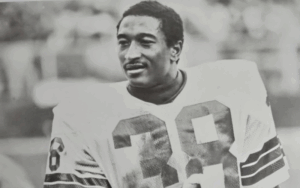
The Making of an Athlete
The Webster family cherished athleticism and excellence which is why Cornell’s talent wasn’t a surprise — sports ran deep for the Websters. One of his brothers played basketball at Whitworth College in Spokane, Washington, while another brother attended San Jose State as a wide receiver and in high school, set a long jump record of 24 feet 9 inches.
Cornell was a standout at Garey High School in Pomona, California, where he played tailback and safety on the football team. As a senior, he averaged over 13 yards per carry and quickly gained a reputation for being perhaps the best all-around athlete in the region.
College soon followed, and Cornell attended Scottsdale Junior College in Arizona, where he was a Junior College All-American in 1973, intercepting an incredible 11 passes that season. He then transferred to UCLA, where he initially played as a split end. However, coaches soon recognized his defensive instincts and moved him to cornerback, a decision which would shape his later playing career. Cornell finished his collegiate career at the University of Tulsa, where in 1976 he earned All-Missouri Valley Conference honors as a defensive back.

NFL Career: Grit and Glory
Cornell’s path to the National Football League was earned through grit, sacrifice, and sheer will. He was considered by many different teams including the Los Angeles Rams, Atlanta Falcons, Washington Redskins, San Diego Chargers, Cleveland Browns, Baltimore Colts, and even teams in Canada, before finding a home with the Seattle Seahawks. He proudly wore jersey #38.
At just 22 years old, Cornell quickly became a key player for the Seahawks, standing out not only for his skill but also for his poise. He was surrounded by former Tulsa teammates such as Steve Largent, Rick Engles, I.V. Wilson, Steve August, and his former Tulsa coach Jerry Rhome. This circle of familiarity made Seattle feel like home. Known to teammates as “C” or “C-Dub,” Cornell once said, “I just like the Seattle program.”
Cornell’s impact was immediate. He was named Player of the Week following his outstanding performance against the Pittsburgh Steelers and received game balls for his contributions in matchups against the Chicago Bears, Atlanta Falcons, and Oakland Raiders.
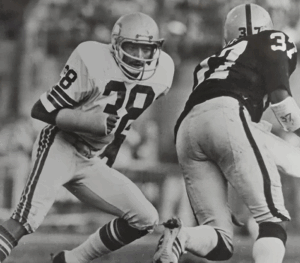
As an athlete, Cornell exemplified mental toughness and physical excellence. His sharp instincts, leadership, and relentless energy made him a reliable and respected force on the field. Every game he played wasn’t just about performance — it was about heart, pride, and inspiring others through action.
Family, Community, and Personal Passions
Outside of his athletic pursuits, Cornell was a dedicated husband, father, sibling, and friend. He married Angelia (Jan) Webster, with whom he established a blended family consisting of four children: Roque, Chanta, Glen, and Mercedes. Their legacy of love is further reflected in their 12 grandchildren and four great-grandchildren.
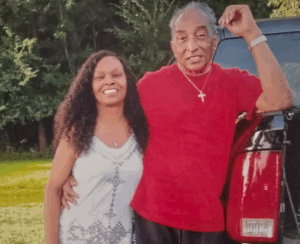
Together, Cornell and Jan shared a passion for travel and discovery. They embraced adventures near and far, often accompanied by Jan’s mother, Dr. L. Toby Earles. The trio presented workshops and seminars to various organizations, including rookies for the Seattle Seahawks. Their message of positivity, inspiration, and character-building even took them to Brazil, where they were welcomed by communities eager to learn from their experience.
Cornell was known for his kindness, humility, and wisdom. He gave back freely, mentoring young athletes, supporting local initiatives, and offering encouragement to those in need. His belief in the power of education, discipline, and second chances shaped his interactions with everyone he encountered.
Decline in Health
In his later years, Cornell began to experience troubling symptoms which we suspect were due to Chronic Traumatic Encephalopathy (CTE), a degenerative brain disease linked to repeated head trauma. As his condition worsened, he began to have issues with his memory, behavior, and daily functioning.
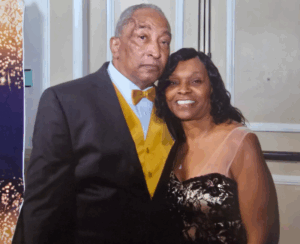
One day, Cornell left home to go to the store and didn’t return. At first, Jan waited, thinking he might be delayed. But after 30 minutes passed, she became concerned. Panic set in as she called local hospitals and checked all the places he typically visited. No one had seen him. She stayed up all night, consumed by worry. The next day, she contacted local authorities and filed a Silver Alert.
Soon after, a nurse recognized Cornell from a previous hospital visit. He was admitted under the designation “John Doe.” Jan rushed to the hospital, heart pounding, and found him confused and disoriented. That day marked a significant change.
As Cornell’s condition declined, the Webster family became fierce advocates for awareness and research around CTE. They stood by him every step of the way, determined to use his story to spark change. Though his brain could not be tested after death due to life support measures, his journey has already contributed to the growing national dialogue around player safety and long-term health.
Legacy and Remembrance
Cornell Webster’s legacy is one of strength, courage, and humanity. On the field, he was a master of his craft. Off it, he was a man of grace, principle, and compassion.
He is remembered not only as an elite athlete but as a devoted husband, father, grandfather, and friend. He inspired everyone who had the honor of knowing him. His life continues to influence discussions around athlete health and mental wellness.
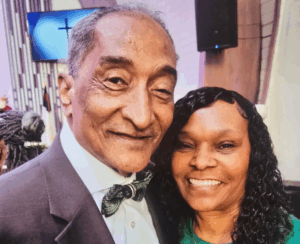
Ultimately, Cornell’s story reminds us that greatness is not measured by trophies or statistics alone—but by how we love, how we lead, and how we rise in the face of adversity. His life is a powerful testament to faith, perseverance, and the lasting impact of a man who gave all he had to everything he loved.